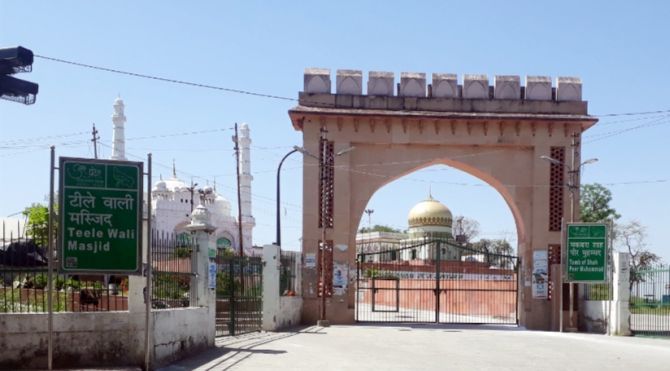Iftar parties for 'rozedars' in the city of Nawabs no longer conjure up the image of mouth-watering galouti kebabs with the aroma of lip-smacking biryani wafting all over.

With markets closed and meat supply hit due to the COVID-19-induced lockdown, Muslims are in for a Ramzan without their favourite kebabs and other chicken and mutton dishes.
'Lauki kofta' (a bottle gourd dish) and 'palak (spinach) kebabs' have invaded their dining tables ever since the coronavirus scare has pushed people indoors, leaving the usually vibrant markets, once dotted with 'sewai' and dry fruit stalls all deserted.
The holy month of Ramzan marked by fasting by followers of Islam commenced on Saturday as per the lunar calendar.
The Shahi Imams of the Jama Masjid and the Fatehpuri Masjid in Delhi have appealed to Muslims to offer namaz during Ramzan at their homes and follow lockdown guidelines to prevent the spread of the coronavirus disease.
Abdul Karim, a 35-year-old rickshaw puller, is selling 'egg pakoras' and 'palak kofta' in a narrow bylane in Hussainganj, while his father Suleiman has set up a kiosk to offer sewai (rice vermicelli) a special dish for iftar.

"Since rituals are being followed at home, no one ventures out in the marketplaces. We used to sell kebabs and biryani in the past, but things are different this time," Suleiman said. His son spoke in a similar refrain.
Tauheed, who once did brisk business from his small hotel in the city's Chowk area, said 'aloo tikki' has replaced the famous 'shami kebab on the platter in the absence of supply of chicken and mutton.
Jack fruit has taken the place of mutton, said Nadeem. "Inshallah, it is more of fasting than of feasting this time," he said.
Every year, the sighting of the Ramzan moon brings joy and happiness for Muslims, as this is the holiest month for them, during which they refrain from eating and drinking from dawn to dusk for 30 days.

At the crack of dawn, people gather for 'sehri' and eat together before beginning the fast. As the sun sets, preparations are made for 'iftar', when the community gets together after breaking the roza and head to mosques to perform the special 'taraveeh' prayers.
But, this year prominent mosques in the Uttar Pradesh capital wore a deserted look, a marked departure from the days when the poor used to line up for iftar food and some alms.
In a video message, Syed Ahmed Bukhari, the Shahi Imam of the Jama Masjid, has asked people not to venture outside unnecessarily and remain indoors during Ramzan for prayers.
"Namaz and Taraveeh (ritual prayer) should be offered at home. Care should be taken that not more than three to four people read the Tarabi because large numbers can be harmful for families and the society in view of the pandemic," Bukhari said.

The Shahi Imam of the Fatehpuri Masjid, Mufti Mukarram Ahmed, said those who are under quarantine and unable to observe 'roza' (fast) can compensate for it through 'Qaza'. Such persons can observe fast later, he said.
Besides the imams, Prime Minister Narendra Modi and Uttar Pradesh Chief Minister Yogi Adityanath have appealed to the community this year to not go to mosques but stay at home and follow the rituals.
"The spectre of coronavirus has cast a shadow over the festive spirit and has brought along with it a sense of gloom, especially for those who used to make annual earnings at this time of the year," lamented Naseem, a small trader in famous Aminabad market.

A Muslim scholar observed that COVID-19 has changed many things.
"This year's Ramzan will be special in the sense that due to the lockdown and physical distancing, people have to avoid mass gathering in mosques," he said, requesting anonymity.
He noted that the Muslim community has taken a wise decision to carry out all religious activities from the confines of homes.










